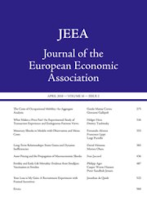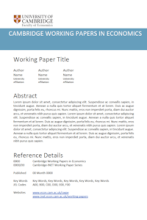Originally, the project had two parts, part one was on price discrimination and the the second part was on heterogenous valued paths. We have made progress on both parts - we have developed and analyzed theoretical models of both problems. But for the experimental side we decided to focus our energies on information and pricing in networks. A major part of these experiments were published in the paper titled, Trading in Networks: Theory and Experiments in the Journal of European Economic Association in 2017. The project and the paper published are joint work with Syngjoo Choi (Seoul) and Andrea Galeotti (EUI).
I note that the JEEA paper was discussed at length in my final report on the project titled, 'Experiments on Financial Networks', which was submitted to the Keynes Fund Managers in April 2017. The present report covers experiments that were not included in that published paper but are included in a separate paper titled, 'Trading in Networks: Uniform Prices'.
I would like to add that these two projects, funded by the Keynes Fund, were an important input in on-going my European Horizon 2020 Award that studies large scale experiments. The award is worth 2.6 million Euros, and involves collaboration with economists, social scientists, mathematicians, and physicists across 7 universities (Alto in Finland; Cambridge and Oxford in the UK; Carlos 3, Valencia and Zaragoza in Spain; University of Amsterdam in Netherlands).
Trading in Networks: Theory and Experiments
Trading in Networks: Theory and Experiments, Syngjoo Choi, Andrea Galeotti and Sanjeev Goyal, Journal of the European Economic Association, Vol. 15(4) pp. 784–817 (2017)
We propose a model of posted prices in networks. The model maps traditional concepts of market power, competition and double marginalization into networks, allowing for the study of pricing in complex structures of intermediation, such as supply chains, transportation and communication networks and financial brokerage. We provide a complete characterization of equilibrium prices. Our experiments complement our theoretical work and point to $\textit{node criticality}$ as an organizing principle for understanding pricing, efficiency and the division of surplus in networked markets.
Brokerage Rents and Intermediation Networks
Brokerage Rents and Intermediation Networks, Syngjoo Choi, Sanjeev Goyal and Frédéric Moisan, Proceedings of the National Academy of Sciences, Vol. 120 no. 28 (2023)
This paper provides experimental evidence on the economic determinants of intermediation networks by considering two pricing rules – respectively criticality and betweenness – and three group sizes of subjects – 10, 50 and 100 subjects. We find that when brokerage benefits accrue only to traders who lie on all paths of intermediation, stable networks involve interconnected cycles, and trading path lengths grow while linking and payoff inequality remain modest as the number of traders grows. By contrast, when brokerage benefits are equally distributed among traders on the shortest paths, stable networks contain a few hubs that provide the vast majority of links, and trading path lengths remain unchanged while linking and payoff inequality explode as the number of traders grows.
Connectors and Influencers
Connectors and Influencers, Syngjoo Choi, Sanjeev Goyal and Frédéric Moisan, Cambridge Working Papers in Economics (2019)
This paper reports an experiment on costly information purchase and link formation for information gathering. A `star' network with two information configurations is predicted - a pure influencer outcome in which the hub purchases information while all others free ride and a pure connector outcome in which the hub purchases no information and the peripheral players purchase information. The latter exists only for large groups and the former exists regardless of group size. We test these predictions on a new experimental platform with asynchronous activity in continuous time. Our experiments provide strong support for the predictions with evidence on the role of group size and payoff information. In large groups, the pure influencer outcome with excessive information purchase is prevalent when subjects only see their own payoffs, whereas the pure connector outcome becomes common when subjects see everyone's payoffs.
Networks: An Economics Approach
Goyal, S., (2023), MIT Press
An accessible and comprehensive overview of the economic theory and the realities of networks written by a pioneering economics researcher.
Networks are everywhere: the infrastructure that brings water into our homes, the social networks made up of our friends and families, the supply chains connecting cities, people, and goods. These interconnections contain economic trade-offs: for example, should an airline operate direct flights between cities or route all its flights through a hub? Viewing networks through an economics lens, this textbook considers the costs and benefits that govern their formation and functioning.
Networks are central to an understanding of the production, consumption, and information that lie at the heart of economic activity. Sanjeev Goyal provides advanced undergraduate and graduate students with an accessible and comprehensive introduction to the economics research on networks of the past twenty-five years. Each chapter introduces a theoretical model illustrated with the help of case studies and formal proofs. After introducing the theoretical concepts, Goyal examines economic networks, including infrastructure, security, market power, and financial networks. He then covers social networks, with chapters on coordinating activity, communication and learning, information networks, epidemics, and impersonal markets. Finally, Goyal locates social and economic networks in a broader context covering networked markets, economic development, trust, and group networks in their relation to markets and the state.




